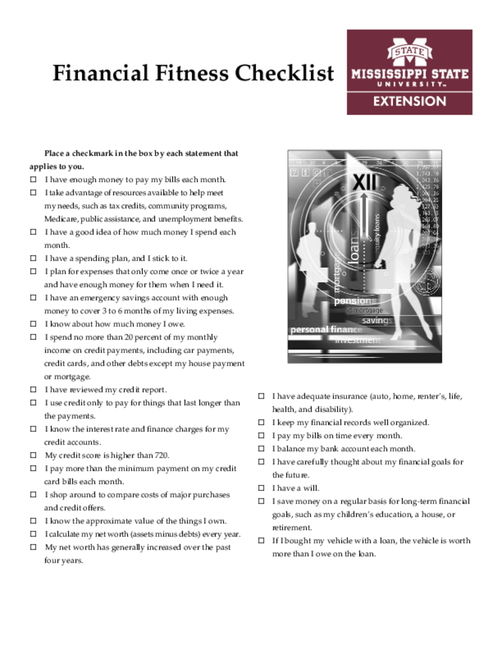Financial Fitness Checklist
Place a checkmark by each statement that applies to you.
- I have enough money to pay my bills each month.
- I take advantage of resources available to help meet my needs, such as tax credits, community programs, Medicare, public assistance, and unemployment benefits.
- I have a good idea of how much money I spend each month.
- I have a spending plan, and I stick to it.
- I plan for expenses that only come once or twice a year and have enough money for them when I need it.
- I have an emergency savings account with enough money to cover 3 to 6 months of my living expenses.
- I know about how much money I owe.
- I spend no more than 20 percent of my monthly income on credit payments, including car payments, credit cards, and other debts except my house payment or mortgage.
- I have reviewed my credit report.
- I use credit only to pay for things that last longer than the payments.
- I know the interest rate and finance charges for my credit accounts.
- My credit score is higher than 720.
- I pay more than the minimum payment on my credit card bills each month.
- I shop around to compare costs of major purchases and credit offers.
- I know the approximate value of the things I own.
- I calculate my net worth (assets minus debts) every year.
- My net worth has generally increased over the past four years.
- I have adequate insurance (auto, home, renter’s, life, health, and disability).
- I keep my financial records well organized.
- I pay my bills on time every month.
- I balance my bank account each month.
- I have carefully thought about my financial goals for the future.
- I have a will.
- I save money on a regular basis for long-term financial goals, such as my children’s education, a house, or retirement.
- If I bought my vehicle with a loan, the vehicle is worth more than I owe on the loan.
Financial Fitness Level
Count up the number of checkmarks to get your score.
If you scored 0–8 — You need lots of help, but don’t worry! It is never too late to take steps to improve your finances.
If you scored 9–12 — You are headed for financial difficulty. Now is the time to act and get back on financial track.
If you scored 13–16 — You are doing a fair job of managing your finances and have taken some steps in the right direction.
If you scored 17–20 — You are doing a good job and are above average in managing your finances.
If you scored 21–25 — You are in excellent financial shape. Keep up the good work!
See Extension Publication 2398 Financial Fitness: Exercises to Shape Up Your Spending. To view an online video companion to this publication, go to http://extension.msstate.edu/family/family-financial-management/basic-m… and click on Financial Fitness: Flexible Expenses Video.
Information Sheet 1762 (POD-04-19)
Revised by Rebecca Smith, PhD, Assistant Extension Professor, Agricultural Economics. Originally written by Bobbie Shaffett, PhD, retired Extension Professor, Family Resource Management.
Copyright 2019 by Mississippi State University. All rights reserved. This publication may be copied and distributed without alteration for nonprofit educational purposes provided that credit is given to the Mississippi State University Extension Service.
Produced by Agricultural Communications.
Mississippi State University is an equal opportunity institution. Discrimination in university employment, programs, or activities based on race, color, ethnicity, sex, pregnancy, religion, national origin, disability, age, sexual orientation, genetic information, status as a U.S. veteran, or any other status protected by applicable law is prohibited. Questions about equal opportunity programs or compliance should be directed to the Office of Compliance and Integrity, 56 Morgan Avenue, P.O. 6044, Mississippi State, MS 39762, (662) 325-5839.
Extension Service of Mississippi State University, cooperating with U.S. Department of Agriculture. Published in furtherance of Acts of Congress, May 8 and June 30, 1914. GARY B. JACKSON, Director
